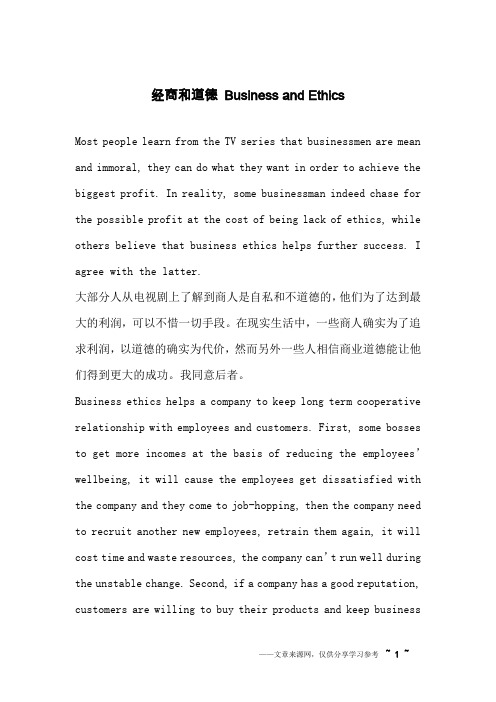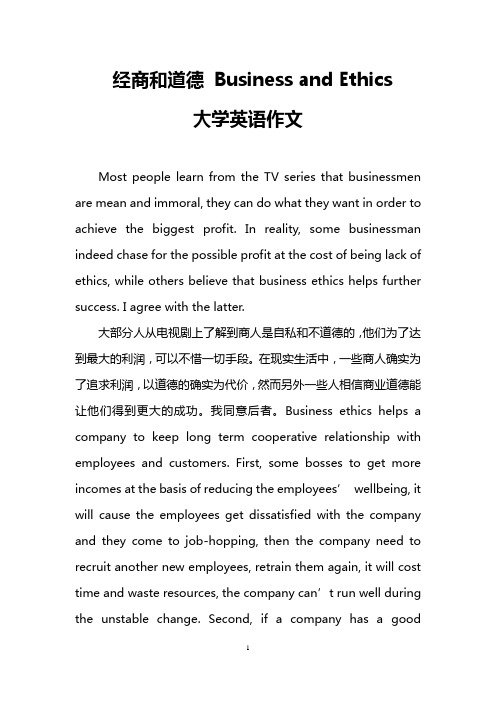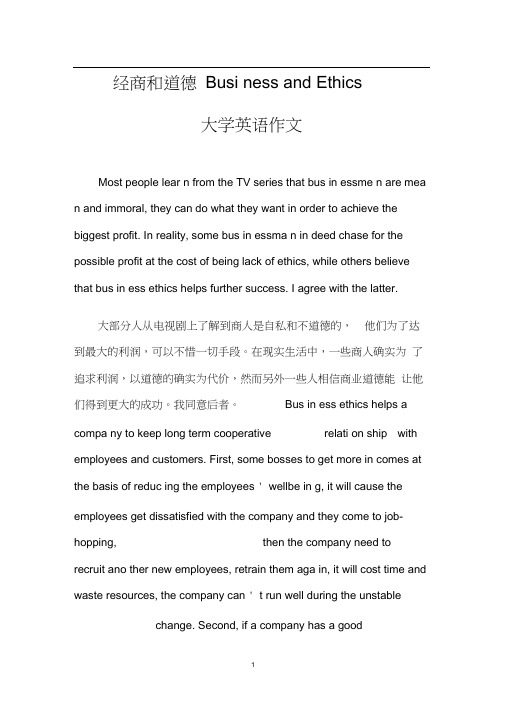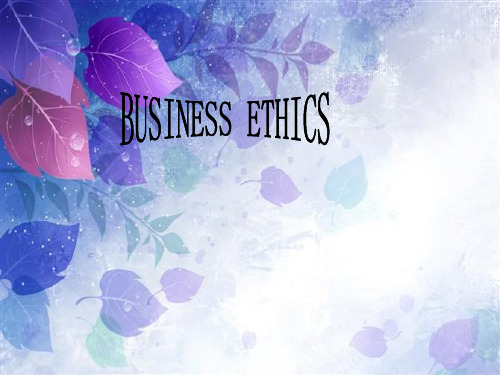business ethics英
- 格式:ppt
- 大小:4.50 MB
- 文档页数:18

经商和道德Business and EthicsMost people learn from the TV series that businessmen are mean and immoral, they can do what they want in order to achieve the biggest profit. In reality, some businessman indeed chase for the possible profit at the cost of being lack of ethics, while others believe that business ethics helps further success. I agree with the latter.大部分人从电视剧上了解到商人是自私和不道德的,他们为了达到最大的利润,可以不惜一切手段。
在现实生活中,一些商人确实为了追求利润,以道德的确实为代价,然而另外一些人相信商业道德能让他们得到更大的成功。
我同意后者。
Business ethics helps a company to keep long term cooperative relationship with employees and customers. First, some bosses to get more incomes at the basis of reducing the employees’wellbeing, it will cause the employees get dissatisfied with the company and they come to job-hopping, then the company need to recruit another new employees, retrain them again, it will cost time and waste resources, the company can’t run well during the unstable change. Second, if a company has a good reputation, customers are willing to buy their products and keep businesswith the company. On the contrary, no one is willing to buy the company’s products which is immoral, the product may be not in good quality, it will do harm to people’s health.商业道德能让一个公司和员工以及顾客保持长期的合作关系。

![[整理版]BriberyandBusinessEthics英译汉](https://img.taocdn.com/s1/m/d1370b37ae45b307e87101f69e3143323968f527.png)
Bribery and Business EthicsStudents taking business courses are sometimes a little surprised to find that classes on business ethics have been included in their schedule. They often do not realize that bribery in various forms is on the increase in many countries and, in some, has been a way of life for centuries.Suppose that during a negotiation with some government officials, the Minister of Trade makes it clear to you that if you offer him a substantial bribe, you will find it much easier to get an import license for your goods, and you are also likely to avoi d “procedural delays”, as he puts it. Now, the question is: do you pay up or stand by your principles?It is easy to talk about having high moral standards but, in practice, what would one really do in such a situation? Some time ago a British car manufacturer was accused of operating a fund to pay bribes, and of other questionable practices such as paying agents and purchasers an exaggerated commission, offering additional discounts, and making payments to numbered bank accounts in Switzerland.The company rejected these charges and they were later withdrawn. Nevertheless, at that time, there were people in the motor industry in Britain who were prepared to say in private:“Look, we’re in a very competitive business. Every year we’re selling more than a £1,000 million worth of cars abroad. If we spend a few million pounds to keep some of the buyers happy, who’s hurt? If we didn’t do it, someone else would.”It is difficult to resist the impression that bribery and other questionable payments are on the increase. Indeed, they seem to have become a fact of commercial life. T o take just one example, the Chrysler Corporation, third largest of the U.S. car manufacturers, revealed that it made questionable payments of more than $2.5 million between 1971 and 1976.By announcing this, it joined more than 300 other U.S. companies that had admitted to the U.S. Securities and Exchange Commission that they had made payments of one kind or another —bribes, extra discounts, etc. —in recent years. For discussion purposes, we can divide these payments into three broad categories.The first category consists of substantial payments made for political purposes or to secure major contracts. For example, one U.S. Corporation offered a large sum of money in support of a U.S. presidential candidate at a time when the company was under investigation for possible violations ofU.S. business laws. This same company, it was revealed, was ready to finance secret U.S. efforts to throw out the government of Chile.In this category, we may also include large payments made to ruling families or their close advisers in order to secure arms sales or major petroleum or construction contracts. In a court case involving an arms deal with Iran, a witness claimed that £ 1 million had been paid by a British company to a “negotiator” who helped close a deal for the supply of tanks and other military equipment to that country. Other countries have also been known to put pressure on foreign companies to make donations to party bank accounts.The second category covers payments made to obtain quicker official approval of some project, to speed up the wheels of government. An interesting example of this kind of payment is provided by the story of a sales manager who had been trying for some months to sell road machinery to the Minister of Works of a Caribbean country. Finally, he hit upon the answer.Discovering that the minister collected rare books, he bought a rare edition of a book, slipped $20,000 within its pages,then presented it to the minister. This man examined its contents, then said: “I understand there is a two-volume edition of this work.” The sales manager, who was quick-witted, replied: “My company cannot afford a two-volume edition, sir, but we could offer you a copy with a preface!” A short time later, the deal was approved.The third category involves payments made in countries where it is traditional to pay people to help with the passage of a business deal. Some Middle East countries would be included on this list, as well as certain Asian countries.Is it possible to devise a code of rules for companies that would prohibit bribery in all its forms? The International Chamber of Commerce (ICC) favors a code of conduct that would ban the giving and seeking of bribes. This code would try to distinguish between commissions paid for real services and exaggerated fees that really amount to bribes. A council has been proposed to manage the code.Unfortunately, opinions differ among members of the ICC concerning how to enforce the code. The British members would like the system to have enough legal power to make companies behave themselves. However, the French delegatesthink it is the business of governments to make and impose law; the job of a business community like the ICC is to say what is right and wrong, but not to impose anything.In a well-known British newspaper, a writer argued recently that “industry is caught in a web of bribery” and that everyone is “on the take”. This is probably an exaggeration. However, today’s businessman, selling in overseas markets, will frequently meet situations where it is difficult to square his business interests with his moral conscience.。

经商和道德Business and Ethics大学英语作文Most people learn from the TV series that businessmen are mean and immoral, they can do what they want in order to achieve the biggest profit. In reality, some businessman indeed chase for the possible profit at the cost of being lack of ethics, while others believe that business ethics helps further success. I agree with the latter.大部分人从电视剧上了解到商人是自私和不道德的,他们为了达到最大的利润,可以不惜一切手段。
在现实生活中,一些商人确实为了追求利润,以道德的确实为代价,然而另外一些人相信商业道德能让他们得到更大的成功。
我同意后者。
Business ethics helps a company to keep long term cooperative relationship with employees and customers. First, some bosses to get more incomes at the basis of reducing the employees’wellbeing, it will cause the employees get dissatisfied with the company and they come to job-hopping, then the company need to recruit another new employees, retrain them again, it will cost time and waste resources, the company can’t run well during the unstable change. Second, if a company has a goodreputation, customers are willing to buy their products and keep business with the company. On the contrary, no one is willing to buy the company’s products which is immoral, the product may be not in good quality, it will do harm to people’s health.商业道德能让一个公司和员工以及顾客保持长期的合作关系。

经商和道德Busi ness and Ethics大学英语作文Most people lear n from the TV series that bus in essme n are mea n and immoral, they can do what they want in order to achieve the biggest profit. In reality, some bus in essma n in deed chase for the possible profit at the cost of being lack of ethics, while others believe that bus in ess ethics helps further success. I agree with the latter.大部分人从电视剧上了解到商人是自私和不道德的,他们为了达到最大的利润,可以不惜一切手段。
在现实生活中,一些商人确实为了追求利润,以道德的确实为代价,然而另外一些人相信商业道德能让他们得到更大的成功。
我同意后者。
Bus in ess ethics helps a compa ny to keep long term cooperative relati on ship with employees and customers. First, some bosses to get more in comes at the basis of reduc ing the employees ' wellbe in g, it will cause the employees get dissatisfied with the company and they come to job-hopping, then the company need to recruit ano ther new employees, retrain them aga in, it will cost time and waste resources, the company can ' t run well during the unstablechange. Second, if a company has a goodreputation, customers are willing to buy their products andkeep bus in ess with the compa ny. On the con trary, no one is willing to buy the company ' s products which is immoral, the product may be not in good quality, it will do harm to people ' s health.商业道德能让一个公司和员工以及顾客保持长期的合作关系。

Unit 5 Business EthicsObjectivesAfter finishing this unit, students will be able to● talk about the issues of business ethics● get an idea of the overall organization of both passages● learn to use key word and expressions● adopt the reading skill I dentifying the Author’s Purpose while reading● learn to control the overall structure of the writingListen and talk (2 periods)Teaching Steps:Step 1 Greetings and Presentation (10M)(class and individual)1. What is business ethics?2. What do yo u know about Japanese’s business?Step 2 Lead-in (Listen twice and fill in the missing words, then check S s’ answers ) (10M)(class and individual )Step 3 Sample Dialogue 1 (15minutes)(class and pair work)1. Listen to the dialogue and get to know the content of the dialogue.2. Listen to the tape once again and answer the questions1) How to bargain with the businessman?2) What is retail price?3. Read and follow the tape and explain some of the language points1) retail: sell by retail 零售the retail price零售价格e.g. He buys wholesale and sells retail. 他整买零卖。
Unit5BusinessEthics课文翻译大学体验英语四Unit 5 Business EthicsPassage A The Moral Advantage: How to Succeed in Business by Doing the Right ThingAs for the moral advantage in business, of all places, everyone knows a modicum of ethics is called for in any business - you can't cheat your customers forever and get away with it. But wouldn't it be more advantageous if you actually could get away with it? Profits would soar out of sight! Then you would really have an advantage, or so the thinking might go.The notion of seeking the moral advantage is a new way of thinking about ethics and virtue in business, an approach that does not accept the need for trade-offs between ambition and conscience. Far from obstructing the drive for success, a sense of moral purpose can help individuals and companies achieve at the highest - and most profitable - levels.Cynicism dominates our attitudes about what it takes to succeed in business. A common way of thinking about morality in business goes something like this: Ethical conduct is an unpleasant medicine that society forces down business people's throats to protect the public interest from business avarice.Morality gets in the way of the cold, hard actions truly ambitious Skepticism people must take to reach their goals.Moneymaking is inevitably tainted by greed, deceit, and exploitation.The quest for profits stands in opposition to everything that is moral, fair, decent, and charitable.Skepticism about moneymaking goes back a long way. The Bible warns that it's harder for a rich man to enter the kingdomof heaven than for a camel to pass through the eye of a needle. "Behind every great fortune," wrote French no velist Honoré de Balzac in the 1800s, "lies a great crime." British author G. K. Chesterton sounded the same theme in the early 20th century, noting that a businessman "is the only man who is forever apologizing for his occupation."The contemporary media often characterize business as nothing more than a self-serving exercise in greed, carried out in as corrupt and ruthless a manner as possible. In television and movies, moneymaking in business is tainted by avarice, exploitation, or downright villainy. The unflattering portrayals have become even more pointed over time. In 1969, the businessman in Philip Roth's Goodbye, Columbus advises the story's protagonist, "To get by in business, you've got to be a bit of a thief." He seems like a benignly wise, figure compared with Wall Street's 1980s icon, Gordon Gekko, whoseimmortal words were "Greed is good."Yet some important observers of business see things differently. Widely read gurus such as Stephen Covey and Tom Peters point to the practical utility of moral virtues such as compassion, responsibility, fairness, and honesty. They suggest that virtue is an essential ingredient in the recipe for success, and that moral standards are not merely commendable choices but necessary components of a thriving business career. This is a frequent theme in commencement addresses and other personal testimonials: Virtuous behavior advances a career in the long run by building trust and reputation, whereas ethical shortcomings eventually derail careers. The humorist Dorothy Parker captured this idea in one of her signature quips: "Time wounds all heels.So who's right --- those who believe that morality andbusiness are mutually exclusive, or those who believe they reinforce one another? Do nice guys finish last, or are those who advocate doing well by doing good the real winners? Is the business world a den of thievery or a haven for upstanding citizens?With colleagues Howard Gardner at Harvard University and Mihaly Csikszentmihalyi at Claremont Graduate University, I've examined this question by interviewing 40 top business leaders, such as McDonald's CEO Jack Greenberg and the late Washington Post publisher Katharine Graham, between 1998 and 2000 as part of our joint "Project on Good Work." We found that a strong sense of moral purpose not only promotes a business career but also provides a telling advantage in the quest to build a thriving enterprise. In fact, a sense of moral purpose stands at the center of all successful business innovations. Far from being a constraining force that merely keeps people honest and out of trouble, morality creates a fertile source of business motivation, inspiration, and innovation.This is different from the view of morality you'll encounter in a typical business-ethics course. It's so different that I now speak about moralities, in the plural, when discussing the role of virtue and ethics in business. Morality in business has three distinct faces, each playing its own special role in ensuring business success.A道德利益:怎样在商业中遵纪守法获得成功道德利益,它存在于商业中,以及所有其他领域里。